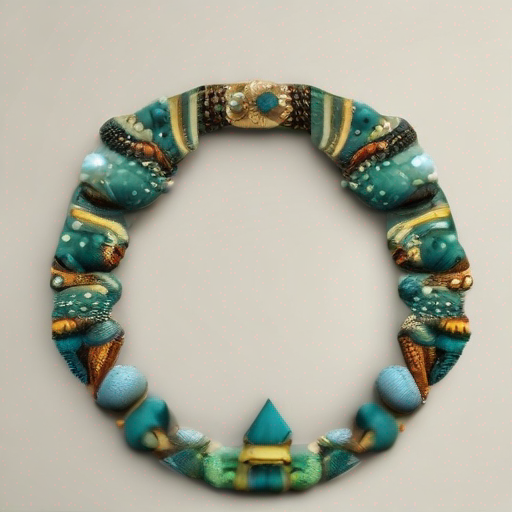
Nigerian Traditional Necklace: Adorning Culture and Beauty Through Timeless Designs
The art of adorning oneself with traditional necklaces is a cherished part of Nigerian culture, passed down through generations. These exquisite pieces of jewelry not only reflect the wearer's cultural heritage but also serve as symbols of beauty, elegance, and storytelling.
From the intricate designs to the vibrant colors, Nigerian traditional necklaces have been an integral part of the country's rich cultural tapestry. In this article, we will delve into the world of these stunning necklaces, exploring their significance, history, and the various styles that have been passed down through generations.
A Brief History
The tradition of adorning oneself with necklaces dates back to ancient times in Nigeria. The earliest recorded evidence of traditional necklace-making can be traced back to the Yoruba people, who inhabited the southwestern region of the country. These early necklaces were made from natural materials such as beads, shells, and wood, which were often decorated with intricate designs and patterns.
Over time, the art of traditional necklace-making spread across different regions of Nigeria, with each group developing its unique style and technique. The Hausa people in the north, for instance, are renowned for their beautifully crafted beaded necklaces, while the Igbo people in the east have a tradition of creating stunning glass bead necklaces.
Significance
Nigerian traditional necklaces hold immense cultural significance. They serve as symbols of identity, status, and beauty. In many Nigerian communities, the type of necklace one wears can indicate their social standing, marital status, or even their occupation. For instance, a woman who wears a traditional necklace adorned with coral beads may signify that she is married.
These necklaces also play a significant role in storytelling. Each design element has its own meaning and significance, and the story behind the necklace's creation is often passed down through generations. In this way, Nigerian traditional necklaces serve as tangible connections to one's cultural heritage.
Designs
Nigerian traditional necklaces are characterized by their unique designs, which often reflect the wearer's cultural background. Some of the most popular designs include:
- Beadwork: This style is characterized by intricate beadwork and is often used in Hausa and Fulani traditional necklaces.
- Glass beads: The Igbo people are known for their beautifully crafted glass bead necklaces, which are often adorned with colorful beads and shells.
- Metalwork: Some Nigerian traditional necklaces feature metalwork designs, such as copper or bronze ornaments, which are often used in Yoruba and Fulani jewelry.
Making the Necklace
The art of making a Nigerian traditional necklace is a labor-intensive process that requires great skill and patience. The process typically involves several steps:
- Design: The designer creates a unique design for the necklace, taking into account the cultural significance and symbolism behind each element.
- Material selection: The chosen materials are carefully selected to ensure they meet the desired aesthetic and symbolic standards.
- Creation: The designer begins crafting the necklace, using traditional techniques such as beadwork, metalwork, or glass bead making.
- Finishing touches: The finished necklace is then embellished with additional details, such as intricate designs or patterns.
Preservation
In recent years, there has been a growing concern about the preservation of Nigerian traditional necklaces and the cultural heritage they represent. Efforts are being made to document and preserve these beautiful pieces of jewelry, ensuring that future generations can appreciate and learn from them.
Conclusion
Nigerian traditional necklaces are more than just beautiful pieces of jewelry – they are symbols of culture, identity, and beauty. These stunning designs have been passed down through generations, and their significance extends far beyond the individual wearer. As we continue to celebrate and preserve this cultural heritage, it is essential that we also acknowledge the importance of these traditional necklaces in the context of modern Nigerian society.
FAQ
Q: What are some popular types of beads used in Nigerian traditional necklaces?
A: Some popular types of beads include coral beads, glass beads, and metal beads.
Q: How do Nigerian traditional necklaces reflect cultural heritage?
A: These necklaces often symbolize social standing, marital status, or occupation, and each design element has its own meaning and significance.
Q: Can anyone make a Nigerian traditional necklace?
A: The art of making these necklaces requires great skill and patience. It is typically passed down through generations or learned from experienced designers.
Key Takeaways
• Cultural Significance: Nigerian traditional necklaces hold immense cultural significance, serving as symbols of identity, status, and beauty.
• Designs: These necklaces are characterized by unique designs that often reflect the wearer's cultural background.
• Preservation: Efforts are being made to document and preserve these beautiful pieces of jewelry, ensuring that future generations can appreciate and learn from them.
Table: Types of Nigerian Traditional Necklaces
| Type | Description |
|---|---|
| Beadwork | Characterized by intricate beadwork and often used in Hausa and Fulani traditional necklaces. |
| Glass beads | Used in Igbo traditional necklaces, often adorned with colorful beads and shells. |
| Metalwork | Features metalwork designs, such as copper or bronze ornaments, often used in Yoruba and Fulani jewelry. |
Learn More
For more information on Nigerian traditional necklaces, visit nigerian traditional necklace
